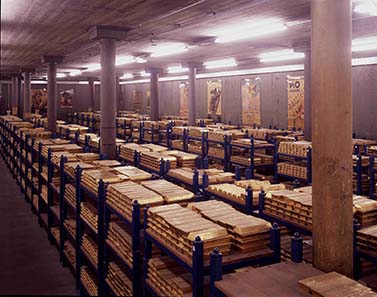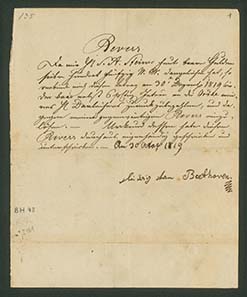March 31, 2011 – Turns of speech such as ‘money makes the world go round’, or ‘lend your money and lose your friend’ reflect the societal significance of our means of payment. As a matter of fact, money influences almost every area of our lives and interaction with others. Money also plays an important role in human communication. We do not only talk about money matters, but also communicate messages through money. By touring a model-type city, visitors to the exhibition ‘The Language of Money’ will experience in what way and to what degree money determines our lives, and how our monetary system functions.
Letter of Ludwig van Beethoven promising to pay off 750 guilder of his dept of 2.420 guilder. By the way, the artist didn’t succeed in doing so…
First of all, in The Marketplace, visitors will learn why people in the 7th century BC came up with the idea of exchanging goods for small pieces of metal, instead of other goods as had been the custom before.
The Gold reserves of the Bank of England © Bank of England, London.
In The Town Hall they will find the answer to the question of why we accept worthless pieces of paper as a means of payment, and in The Mint they will find out how money is made – both genuine currency and counterfeits. The sections The Bank and The Stock Exchange offer more specific information on our financial system. The Shopping Centre studies the social consequences of differences in wealth and property situations. Whilst in estate-based societies, membership of a certain class was fixed for life by people’s birth into that class, in modern industrial societies property is the essential criterion for a person’s social standing.
The Home throws light on personal ways of handling money. The Church gives insight into the religious ideal of renouncing wealth and property, and information about the charitable purpose of collections, donations and church tax as well as the historic trade in ‘indulgences’ and church offices, now regarded as highly suspect sources of income. The Nightclub District addresses other dubious aspects of money, and also a number of important questions such as ‘Does money make you happy?’ or ‘Can everything be bought for money?’. Finally, the tour of the exhibition ends where the dream of ‘fast money’ may lead to – in The Prison.
If you want to visit the homepage of the Museum of Communication in Nuremberg, click here.
Unfortunately this site is available in German only.






